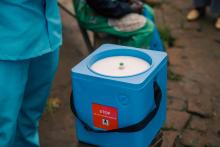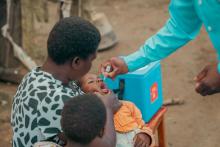Malawi launches third round of mass vaccination drive to stop wild poliovirus
Lilongwe, 11 August 2022 – Malawi today kicked off the third round of vaccination against wild poliovirus type 1 to protect all under 5 children and halt the devastating virus from spreading.
Around 3.4 Million vaccine doses will be administered in the third round of the national mass vaccination campaign. The multiple vaccination rounds aim to interrupt the circulation of the poliovirus by immunizing every child under 5 years with oral polio vaccine regardless of previous immunization status. Malawi declared a wild poliovirus type 1 (WPV1) outbreak in February after detecting a case, the country’s first wild poliovirus case in 30 years. Neighboring Mozambique has also four confirmed wild poliovirus cases.
The previous two mass vaccination rounds were of low quality as only five districts out of 29 in round one and nine districts out of 29 in round two have passed the Lot Quality Assurance Survey (LQAS).
“The circulation of the virus will only be interrupted if the country delivers quality rounds using house to house vaccination strategy” said Dr Neema Rusibamayila Kimambo, World Health Organization (WHO) Representative in Malawi. “I urge all front-line workers and in particular vaccination teams to visit all houses, churches, markets, schools, and communities along the international border to ensure that all children less than five years old are vaccinated.”
While countries in the region (Zambia, Tanzania, Zimbabwe and Mozambique) are implementing the key activities in the Polio Eradication Strategic Plan 2022-2026, the efforts are being threatened by the importation of the WPV1 in Malawi and Mozambique and the circulating vaccine derived polioviruses in other countries. Therefore, achieving and sustaining optimal routine immunization coverage and high-quality vaccination coverages are key to interrupt the transmission of the ongoing polio outbreak.
The Minister of Health, Honorable Khumbize Kandodo Chiponda, MP said in addition to the supplementary immunization, Malawi is intensifying routine immunization and surveillance.
“Even though our routine immunization indicators at national level are good, we are continuing to improve access and utilization of routine immunization services to achieve coverage of at least 90% for all antigens.”
Beyond vaccination, WHO and partners have worked to expand two types of key surveillance interventions to detect potential future polio outbreaks in this region namely: Acute Flaccid Paralysis (AFP) surveillance and environmental surveillance. AFP surveillance aims to detect the physical symptoms of polio, including paralysis and mobility issues, and environmental surveillance seeks to find samples of human fecal waste and water containing traces of polio.
The cases detected in Malawi and Mozambique do not alter Africa’s certification as free of wild poliovirus – an achievement declared in 2020 – because the virus strain is not indigenous. Laboratory analysis linked the strains detected in Malawi and Mozambique to a strain circulating in Pakistan’s Sindh Province in 2019.




